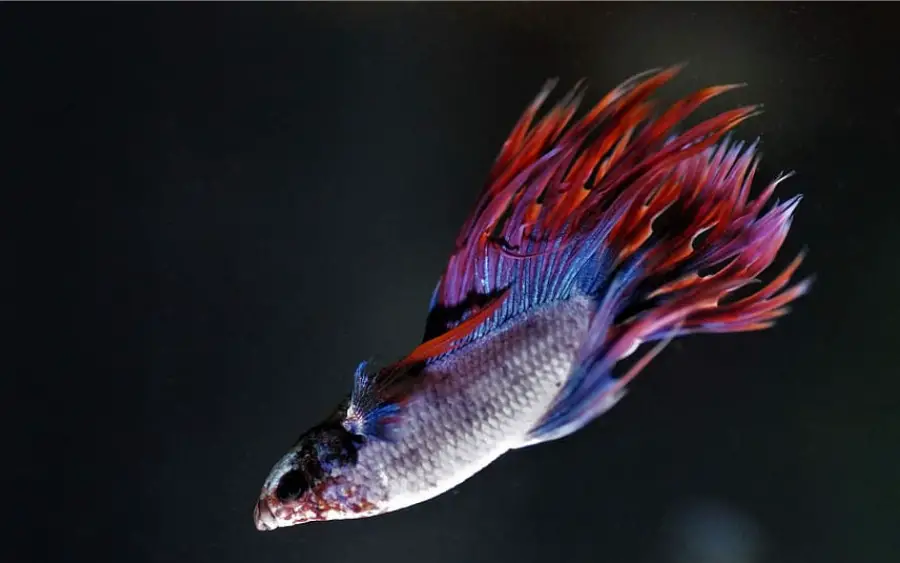Have you ever wondered if the seemingly harmless filter in your betta fish’s tank could be endangering its life? Can a filter kill a betta fish? It’s a question that many betta owners overlook, but the truth is that filters can pose several little-known dangers to these beautiful and delicate creatures.
In this article, we’ll explore the potential risks that filters can present and provide you with valuable insights to ensure the well-being of your Betta.
In short, the answer is yes; a filter can harm or even kill a betta fish if certain precautions aren’t taken. While filters are designed to maintain water quality by removing toxins and impurities, they can create strong currents that are overwhelming for betta fish.
Are filters bad for betta fish? These famous fish, also known as Siamese fighting fish, have delicate fins that can get caught in the filter’s intake or be battered by the strong flow of water.

In the main article, we’ll explore the five little-known dangers filters can pose to betta fish, exploring each in detail.
So, if you’re a betta owner or considering getting one, don’t miss out on this crucial knowledge. Learn about the potential dangers filters can pose to your pet fish and discover practical solutions for keeping a betta happy and thriving.
Let’s dive into this vital topic’s depths and ensure our beloved bettas’ well-being.
Table of Contents
ToggleDo Beta Fish Need Filters?
Does betta need filter? Yes, bettas need a filter and can benefit from having filters in their aquariums. While bettas can survive in stagnant water for short periods, providing them with a suitable biological filtration system is highly recommended for their overall health and well-being.
Filters serve several essential functions in a Betta tank. Firstly, they help to maintain water quality by removing waste, uneaten food, and toxins, which would otherwise accumulate and degrade the water quality.
This helps block the buildup of harmful substances like ammonia and nitrites, which can harm the fish’s health.
Secondly, filters facilitate water circulation and aeration, ensuring sufficient oxygen for the fish to breathe. Proper oxygenation is crucial for their respiratory system and overall vitality.
Furthermore, filters also provide a gentle current in the water, which can mimic the natural environment of Betta, as they are native to slow-moving waters in Southeast Asia.
This current can help stimulate their instincts and encourage exercise, promoting a healthier environment for your fish and a more active lifestyle.
When choosing a corner filter for a Betta fish tank, it’s crucial to select one with a gentle flow and adjustable settings to avoid creating currents that are strong for a betta and may stress or exhaust the fish. Sponge or low-flow power filters are commonly recommended for Betta in a tank.
Remember, even with a filter, regular maintenance, such as water changes and cleaning the filter material, is still necessary to ensure optimal conditions for your betta fish.
Can a Filter Kill a Betta Fish?
Yes, a filter can potentially kill a betta fish if it is not maintained correctly or is too strong for the size of the tank. A filter that is not cleaned regularly can create a buildup of harmful toxins in the water, harming or even killing the fish.

Additionally, a filter with a strong flow rate can create strong currents that make it difficult for betta fish to swim and breathe, leading to stress and potentially fatal health issues.
It is vital to choose a filter suitable for the size of the tank, To prevent a filter from harming betta fish, keep it clean and well-maintained, and ensure that the flow rate is not too strong for the fish.
How Do Aquarium Filters Work?
Aquarium filters work to remove debris, waste, and chemical pollutants from aquarium water, providing a safe and healthy environment for fish and other tank mates. An aquarium filter typically consists of a pump that forces dirty water through a hob filter media, including biological, mechanical, and chemical elements.
Mechanical filtration removes large particles of debris from the water, while biological filter converts harmful fish waste into less toxic nitrate compounds that need to be removed through water changes.
Chemical filtration typically involves activated carbon or other chemicals that absorb toxins and impurities in the water. The size of the fish aquarium and the type of fish living in it will determine the type of filter for your Betta needed and the frequency of maintenance required.
Regular cleaning and replacement of filter media are essential to maintain the effectiveness of the aquarium filter and prevent the build-up of harmful bacteria or algae in the tank.
The Importance of a Filter for Betta Fish
Before diving into the potential dangers, let’s understand why Betta needs a filter in their tank. An aquarium filter plays a significant role in maintaining the water quality within the tank.
It helps removing ammonia and nitrites that are produced by tank fish waste and uneaten food. Without an aquarium filter, these substances can accumulate and stop a severe risk to the health of your Betta.
Additionally, a filter aids in creating water movement and circulation, which oxygenates the water and prevents stagnant areas. This is particularly crucial for Betta, as they require well-oxygenated water in your tank to thrive.
Furthermore, a filter helps to keep the tank water clean by trapping debris and particulate matter, ensuring a healthier environment for your small fish.
– Poor Flow and Strong Currents
One potential danger associated with filters is poor flow or strong currents. Betta fish originate from shallow rice paddies in Southeast Asia, swimming in calm, slow-moving waters. The strong currents created by different filter media, such as power or canister filters, may cause stress and exhaustion for bettas.
To prevent this issue, consider choosing a filter with adjustable flow settings or opt for a low flow filter designed explicitly for betta fish. Alternatively, you can create a baffle using aquarium decorations or sponge filters to reduce the water flow. Ensuring a gentle and manageable water movement will help your fish navigate their environment comfortably.
– Suction Hazards
Another danger of filters is the risk of fish getting sucked into the filter intake. Betta fish have delicate fins and can easily get trapped in the powerful suction of some filters, resulting in torn or injured fins and, in extreme cases, death.
To mitigate this danger, use filter intake covers or sponges to cover the intake area. These accessories help prevent Betta from getting too close to the filter and being pulled in. Regularly inspect the covers or sponges to ensure they are intact and not clogged; a clogged intake cover can reduce the filter’s efficiency.
– Water Parameter Fluctuations
While filters are essential for maintaining optimal water conditions, they can also lead to rapid fluctuations in water parameters if not correctly managed. Filters house filter media, such as biological, mechanical, and chemical filters. Each type serves a specific purpose in maintaining water quality.
However, if the filter media is not regularly cleaned or replaced as needed, it can become clogged, reducing its effectiveness. Clogged filter pads can cause a buildup of ammonia and nitrites, leading to poor water quality and potentially harming your Betta.
Follow the manufacturer’s filter maintenance and cleaning instructions to prevent this danger. Regularly check the filter media and clean or replace it when necessary. Monitoring the water parameters using a test kit can also help ensure a stable and healthy environment for your pet fish.
– Oxygen Depletion
While filters help oxygenate the water, oxygen depletion is potentially dangerous if the filter malfunctions or the tank size is inadequate. Betta fish rely on oxygen dissolved in the water to breathe, and a lack of oxygen can harm their health.
In smaller tanks or poorly ventilated setups, the oxygenation provided by the filter may not be sufficient. It is crucial to ensure that your tank is appropriately sized for your betta fish and that there is enough surface area for gas exchange.
If you notice your beautiful fish gasping for air at the water’s surface or displaying signs of respiratory distress, it may indicate low oxygen levels. In such cases, adding an air stone or increasing water movement can help improve oxygenation.
– Chemical Interactions
Different types of filter media utilize chemical filter media, such as activated carbon, to remove impurities and odors from the water. While this can be beneficial, it is essential to be mindful of potential chemical interactions that may occur.
Some medications or treatments to address specific fish health issues can be absorbed or neutralized by activated carbon. If you are administering medication to your Betta, it is advisable to temporarily remove the activated carbon from the filter to ensure the effectiveness of the treatment.
Additionally, following the recommended guidelines for using chemical filter media and replacing them as instructed is crucial. Over time, these media can become saturated and lose effectiveness, leading to poor water quality and potential health risks for your fish.
Can Betta Fish Survive Without a Filter?
Betta fish are often hardy and can live in a tank without a filter. However, having a filter in the aquarium is crucial for a healthy and thriving aquarium setup. A power or aquarium filter helps remove toxins and ammonia from the water, which are harmful to Betta.
The filter media in the tank setup helps beneficial bacteria to grow that help to break down waste and fish waste in the water. Betta fish can survive without a filter, but it is not ideal for their well-being.
They are susceptible to stress and diseases due to the accumulation of waste in the fish tank. Regular water changes are essential for the maintenance of the aquarium when there is no filter. Overall, it is recommended to have a filter in the aquarium to ensure the best living conditions for betta fish.
How to Setup a Betta Fish Tank without Filter?
Setting up a Betta fish tank without a filter requires extra attention and care to maintain water quality manually. Here’s a step-by-step guide on how to set up a Betta fish tank without a filter:
- Select an appropriate tank: Choose a size suitable for your Betta. A minimum betta tank size of 5 gallons (19 liters) is recommended to provide enough space and water volume for the fish to thrive.
- Add a heater: Betta fish are tropical fish and require a stable water temperature between 75°F and 80°F (24°C to 28°C). Install a reliable aquarium heater to maintain the desired temperature range.
- Use live plants: Live plants can help improve water quality by absorbing nitrates and providing natural filtration. Choose aquatic plants like Java fern, Anubias, or Marimo moss balls, which are hardy and compatible with Betta fish.
- Perform regular water changes: Without an internal filter, you must manually remove waste and debris by performing frequent water changes. Aim for 25-50% weekly water changes to maintain good water quality.
- Use a siphon or gravel vacuum: During water changes, use a siphon or gravel vacuum to clean the substrate and remove any accumulated waste or uneaten food from the tank bottom.
- Monitor water parameters: Test the water regularly using a freshwater aquarium test kit. Monitor parameters such as ammonia, nitrite, nitrate, and pH to ensure they remain within safe levels.
- Avoid overfeeding: Feed your Betta fish a balanced diet in small portions. Overfeeding can lead to excess waste, which may negatively impact water quality.
- Consider adding beneficial bacteria: Since there is no filter to house beneficial bacteria, you can use a liquid beneficial bacteria supplement to help establish a healthy biological balance in the tank. Follow the product instructions for dosing.
- Be observant: Without a filter, it’s important to closely observe your Betta for any signs of stress, illness, or deteriorating water quality. Take immediate action if you notice any issues.
Remember, while it is possible to maintain a Betta fish tank without a filter, it requires more effort to ensure good water quality and cleanliness. Regular maintenance, water testing, and diligence are essential for keeping your Betta healthy and happy in a small tank without a filter.
Commonly Asked Questions about Betta Fish Tank with Filter (FAQs)
How Long Can My Betta Live Without tank Filter?
A betta fish can live without a filter for a short period, but it is not recommended. Harmful toxins can build up quickly without an internal filter, and the betta fish’s lifespan can be significantly shortened.
Do Betta Fish Need a Filter in a 5-Gallon Tank?
Do betta need a filter in small tanks? Yes, bettas need a filter in a 5-gallon tank to maintain water quality and provide a healthy environment. A filter helps to remove harmful toxins and maintain a stable and consistent water temperature, which is crucial for the health and well-being of betta fish.
Can a Betta Live in a Bowl Without a Filter?
While betta fish can technically survive in a bowl without a filter, it is not recommended. Without a filter, harmful toxins can build up quickly, leading to poor water quality and health issues for the fish. A filtered tank is a much healthier and safer environment for bettas.
Do Betta Fish Need Air Pumps?
Betta fish do not need an air pump; they can breathe air directly from the water’s surface. However, an air pump can be beneficial in maintaining water circulation and surface agitation, which helps to oxygenate the water and create a healthier environment for the fish.
Is Betta Fish Filter Too Strong?
Yes, a too-strong filter can harm betta fish by creating strong currents that make it difficult for them to swim around the filter and breathe. Choosing a filter with a flow rate suitable for the tank’s size and the fish’s needs is essential.
Do Betta Fish Need a Heater?
Yes, Betta needs a heater to maintain a stable and consistent water temperature in their tank. Bettas are tropical fish that require a water temperature between 78-82°F (25-28°C) to thrive, and a heater helps to maintain this temperature range and keep the fish healthy.
Do Betta Fish Need Nitrogen Cycle?
Yes, betta fish need the nitrogen cycle in their tank to maintain a healthy environment. The nitrogen cycle refers to the natural process of converting toxic ammonia in the water into less harmful nitrates, which is crucial for the health and well-being of the fish.
Final thoughts
So, can a filter kill a betta fish? In conclusion, while filters are essential for maintaining a healthy aquarium environment, it is crucial to be aware of their potential dangers to betta fish. Poor flow, suction hazards, water parameter fluctuations, oxygen depletion, and chemical interactions are all factors that need to be considered to ensure the well-being of your betta fish. By selecting an appropriate filter, managing the clean water flow, keep your fish safe from suction hazards, maintaining filter media, monitoring oxygen levels, and being mindful of chemical interactions; you can provide a safe and suitable habitat for your betta fish.
Remember, each betta fish is unique, and their needs may vary. Observing your betta fish’s behavior and regularly testing water parameters will help you determine if adjustments are needed to optimize their environment. You can create a thriving and healthy home for your beloved betta fish with proper care and attention.
You might also like
- How to Care for a Betta Fish without Filter: (Solved)
- Betta Fish Blowing Bubbles at the Top of the Tank: 3 Causes & Cure
- Why Is My New Betta Fish Hiding and Not Eating? (Solved)
- Dropsy or Constipation Betta Fish: Here’s 3 apparent Differences
- How Long Can Fish Live Out of the Water? (7 Shocking Facts)
- Can Bettas Live with Guppies (7 Safest Betta Tank Mates)
- Filter Too Strong For Betta: Discover The 5 Hidden Effects
- Betta Fish Natural Habitat: 7 Tips for A Happy Fish
- Are Betta Fish Considered Smart: 5 Mind-Blowing Tricks They Mastered!
- Do Fighting Fish Breathe Air for Extra Abilities (Unveiled)
- Stunning Corner Fish Tank Aquarium: Unique Tanks for Your Fish




